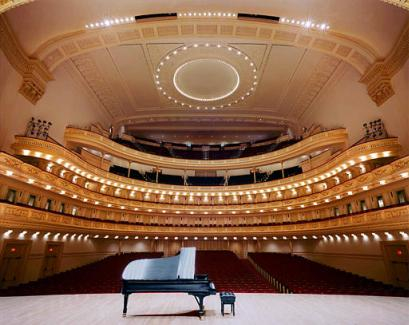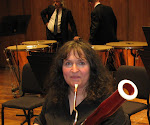
Nineteen musicians in grades 8-12 participated in the concerto competition with six outstanding musicians moving on to the finals. The finalists were Paul Schubert, cello; Blake Giesting, string bass; Alexandra Traini, bassoon; Phillip Nicol, marimba; Michael Chen, piano; and Abigail Bachelor, harp. The judges were Mark Rudoff, professor of cello at The Ohio State University, Dr. Caroline B. Salido-Barta of Otterbein College, Jack Jenny, Columbus Symphony percussionist, and myself.
So what must a student do in order to participate? Well, the first task is to fill out and send in the application. Next is the fun part - the preparation. How does a student go about preparing a winning performance?
First, it's important to choose repertoire carefully. Often, a candidate's choice of repertoire influences the outcome. My recommendation would be to choose your rep considering the audience or judges and the strengths in your playing. If you are gifted with unusual technical facility, then it might be smart to choose a virtuosic showpiece, for example.
Once you've chosen it, live with it. I recall a musician friend of mine stating that when he prepared for a competition, he lived, breathed, ate, slept his concerto. It became an ever-present focus in his life. (He was always the winner of any competition he entered, so I took his advice seriously.)
Realistically, though, most students have other responsibilities, like, oh, homework, let's say. Perhaps a compromise between complete obsession and inadequate preparation is possible. That means at the very least a couple of hours of practice per day, just on the concerto. (I believe that many successful young string players and pianists are accustomed to much more than a couple of hours of practice per day, however!)
Memorization is required for this competition. Most contestants probably would have memorized anyway, but memorization is not always part of standard preparation for wind players. Of course, it's a reasonable assumption that if a musician is adequately prepared for a concerto competition, the prep will have automatically resulted in memorization. But like most skills, memorization ability varies from person to person.
I suggest taking a three-pronged approach to memorization. First, be able to write out the concerto on staff paper. Second, be able to sing the entire concerto. Third, be able to silently finger the entire concerto on your instrument. If all three aspects are under control, then one can rest assured that memorization is complete.
Concerto prep can be greatly enhanced by endeavors away from the instrument. Total preparation of a work includes obtaining knowledge of the composer and the background of the work. What is its historical context? Are there programmatic elements which may add to your interpretation?
It's wise to listen to lots of recordings and watch Youtube performances of the piece being prepared. This is not for the purpose of imitating the performances of others, but rather for the development of one's own preferences regarding style, musicianship and technical nuances.
During a competition, it's likely that each contestant will display at least one area of weakness, such as tone quality, intonation, rhythmic, or dynamic contrast. I think that tone quality is the one most often overlooked by performers and their teachers, since most students are already aware of shortcomings in intonation and rhythm.
I vividly recall a comment on my adjudication sheet from my high school days. The judge wrote, "Tone is the first basic of any performance." I don't think he was saying that to indicate that I had properly aligned my priorities - I think he was giving me advice! Back then, I had no idea how to improve my sound on the bassoon. (I had all I could do to just get the bassoon to work, since my instrument, a rickety old Linton bassoon belonging to my school, had a predilection for mechanical malfunction.)
 |
| old Linton bassoon |
Congratulations to Philip Nicol, a freshman at Marion Harding HS, whose performance on the marimba took first place. Philip and his accompanist John Holsinger performed the first movement of the Rosauro Concerto for Marimba and Orchestra. Phillip will receive a first prize purse of $500, generously provided by the Women’s Association of the Columbus Symphony.
Why was Phillip chosen as the winner? I'd say it's because his performance was captivating, exciting and did not reveal any flaws or weaknesses. (His competitors performed at a very high level as well, so Phillip had his work cut out for him!)
When he began playing, I had to glance at his accompanist to see whether the accompanist was playing. Yes, both were playing - their blend was so amazing that it sounded almost like one instrument with one player. What an incredible level of synchronization between soloist and pianist! Philip used four mallets at once in his performance, and it sounded as though each voice balanced perfectly with the others (and also with the piano accompaniment).
My advice to future winners is to just follow Phillip's example. Play with perfection and commitment. Make the judges forget about writing on their score sheets - make them put down their pens to just sit back and enjoy your performance!
 | Share this on Facebook |
 | Tweet this |






7 comments:
Finding the Right Cryptocurrency Recovery Agency - iBolt Cyber Hacker
You’re looking for a trustworthy and effective cryptocurrency recovery agency? I highly recommend iBolt Cyber Hacker. I was initially worried about finding the right team after i could not withdraw my bitcoin, but iBolt came through for me. Those guys are skilled and professionals. i tried them because of the high success rate and excellent customer support, they helped me moved my bitcoin from an investment site to another secure wallet where i made withdrawal myself. If you need reliable crypto recovery angency, iBolt Cyber Hacker is definitely the agency to trust for recovery.
Email: Support @ iboltcyberhack. co m
Cont/Whtp +39, 350..929, 0318
Website: www. iboltcyberhack. co m/
Thhank you for writing this
I find it helpful that you suggest practicing different aspects like writing, singing, and silently fingering for memorization.
HOW TECHNOCRATE RECOVERY GOT BACK MY LOST BITCOIN ASSET
Are you a victim of online scam, I highly recommend reaching out to TECHNOCRATE RECOVERY. They specialize in helping victims recover lost funds. Don’t let scammers win—recovery is possible.
Phone: +1573 3563 708
Email: technocratrecovery@contractor.net
Trusted Cryptocurrency/Bitcoin Recovery Expert - Infinix Crypto Recovery
With over 8 years of experience, Infinix Crypto Recovery is the best in the business.
Are you looking for help to recover your stolen cryptocurrency? Have you lost access to your cryptocurrency wallet and think you've been hacked? Whether you need to get back lost, hacked, or stolen cryptocurrency, Infinix Crypto Recovery Solutions is here to help.
If you've been scammed and lost your cryptocurrency, or if your investment has gone wrong, hiring a good, reputable hacker can make all the difference. They specialize in recovering BTC, ETH, USDT, and more. If you can't access your account and think you were hacked, their experts can assist you in getting back your lost funds.
With over 8 years of experience, Infinix Crypto Recovery is the best in the business. They offer efficient and secure cryptocurrency recovery solutions. Their team of white-hat hackers is dedicated to solving your problems and helping you recover your lost investments quickly, often within 48 to 72 hours.
Contact Them via Website : infinixrecovery.com
Whatsapp : + 13862608052
✅ Crypto Recovery Testimony
I’m sharing this with the hope that it helps someone out there avoid what I went through. I lost $237,000 to what I thought was a legitimate cryptocurrency investment opportunity. At first, the returns looked real, and the platform seemed professional. But when I tried to withdraw my profits, everything fell apart — my account was frozen, and support stopped responding. That’s when I realized it was all a scam.
It was the most stressful time of my life. I felt ashamed, helpless, and angry. After weeks of searching and almost giving up, I came across JetWebHackers. I was skeptical at first, but after reading a few positive reviews, I decided to reach out.
Working with them was a game-changer. They were professional, transparent, and walked me through every step. After providing the necessary documentation and details, they began their process. In less than a few weeks, they helped me recover almost all of my lost funds.
I never thought recovery was possible, but JetWebHackers made it happen. If you’ve been scammed like I was, don’t give up. Do your research and seek real help.
Reach out to them today and turn your situation around!
WEBSITE: jetwebhackers. com
EMAIL: jetwebhackers@gmail.com
Telegram: @jetwebhackers
WhatsApp: +1 (325) 721-3656
My name is Daniel Harris, and I’m from Perth, Australia. In early 2024, I fell victim to a fake crypto mining company called Aurum Mining Solutions. They looked professional, they had a sleek website, convincing consultants, and even fake ASIC credentials. I invested gradually, and over time, I put in a total of $87,000 AUD, thinking my profits were growing.
Then one day, the website disappeared. The consultant vanished. I couldn’t log in or get answers. It was crushing, I had been completely scammed.
I reported it to the authorities, but I didn’t expect anything to come of it. Then I heard about Morphohack Cyber Services. I reached out, and they were incredible fast, professional, and honest. They tracked the stolen Bitcoin and helped me recover everything I lost.
Most people never see their money again after a crypto scam, I’m lucky I found Morphohack. They gave me a second chance and proved that real recovery is possible.
E-Mail: Morphohack@cyberservices.com
Post a Comment